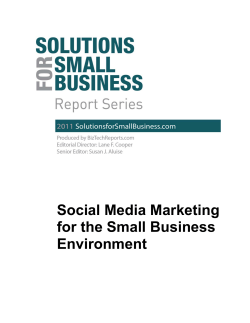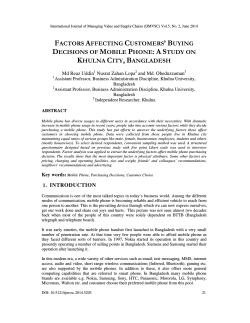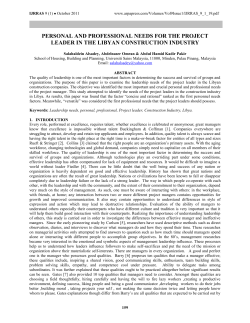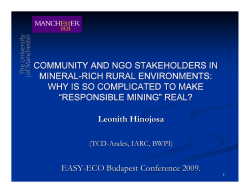
I Why DoD Contractors File Protests, Why Some Don’t, and What the Government Can Do
Why DoD Contractors File Protests, Why Some Don’t, and What the Government Can Do Steve Roemerman I n 1998, I published the results of a 1997 informal poll of defense executives, asking, “Why do DoD contractors file protests?” (“Why DoD Contractors File Protests…and Why Some Don’t,” Program Manager, March-April 1998). In the dozen years since the publication, the calls and questions I continue to receive suggest an enduring interest in the subject, and for that reason, I repeated the poll in conjunction with other research. For the 2010 poll, I used more formal methods. Fifty-nine respondents representing a cross section of government and industry professionals shared their views. Since the emphasis was on contractor behavior, we sought more respondents from industry and in particular those with experience in the program bidding and capture disciplines. They had experience in a wide range of DoD contract types and sizes, and had been involved in the procurement of nearly every type of item and service DoD purchases. Roemerman is chairman of Lone Star Aerospace. He has filled systems, management, and executive roles on more than 20 U.S. and international programs. 9 Defense AT&L: November-December 2010 Of the respondents, 52 had industry experience and roughly half of those also had government experience. Ninety percent of the respondents said they had been close enough to a protest at one time or another to say they had direct involvement of some kind. On average, respondents said they had personally witnessed about three protests, and more than 10 percent of respondents said they witnessed more than six. view, but the belief was more common among government respondents than industry respondents. 5. Prove we did everything possible This “proof” can be aimed at demonstrating resolve for the board, for executive management, or it can be the senior ranks “proving we back up our troops.” A general impression of respondents was that protests have become more common, with nearly 70 percent saying protests were either somewhat, or much more common. A striking result was that none of the respondents felt protests had become less common. That agrees with a recent Government Accountability Office (GAO) report that in fiscal year 2009, 1,989 protests were filed, a 20 percent increase over the 1,652 protests filed in fiscal year 2008, and up 50 percent over fiscal year 2006. 6. Confusion over Award Criteria. If the losing contractor misunderstood the government’s selection criteria, it can be a short step to filing a protest. Nearly 30 percent of respondents felt they’d seen this contribute to protest filings. 7. Poor Debrief In the dozen years since the first article, many losing contractors have shared stories of bad debriefings that angered bidders and “almost” caused a protest. Ironically, some of these aggressive debriefs made the loser more inclined to protest, and respondents felt that did trigger some protests. In one example, a PCO [principal contracting officer] did not follow the Federal Acquisition Regulation, declining to provide information clearly required, and further declining a request that he review the FAR and reconsider. The losing bidder was left with the clear impression that the PCO simply did not respect the bidder enough to play by the rules. This same command did a debrief for a different competition in which the most common response to contractor questions was (according to the bidder), “No, we won’t discuss that.” In another case, a government program manager was apparently intent on proving the weakness of a losing proposal. The PM went far from the government’s scripted position in responding to the bidder’s questions. Instead of committing to get back with an answer, the PM offered extemporaneous reasons that stunned his PCO (because they were irrelevant to the selection of a winner) and angered the bidder (because they were clearly wrong). In both cases, the anger of the losing firm and the apparent lack of transparency by the government set up the climate for a protest to be filed. “Poor debrief” was statistically tied with “prove we did everything” and “confusion over award criteria.” Several Factors, Not Just One Our respondents cited the causes of over 150 protests they had witnessed. On average, each respondent offered about four causes—they tended to see protests as the result of several factors more than of a single thing. As in the earlier article, I have ranked the reported reasons why DoD contractors protest based on how often a cause was cited. 1. Decision maker at the contractor expects to win Nearly 90 percent of respondents offered this reason. It was also first on the 1998 list, when most respondents felt it was a false expectation. 2. The government really does make mistakes In a striking change, more than two thirds of respondents gave this reason. In 1998 most respondents said they could not think of an example involving a major contract. An important but unanswered question is why the perceived rate of errors by the government seems to have increased so much in the past decade. 3. Delay the award or program Over 40 percent of respondents felt that for a number of reasons, it may seem to be in the loser’s tactical or strategic business interests to delay the award. These reasons may involve older programs, funding, and several other issues. A recent seminar by a law firm handling protests seemed to suggest this as a reason an incumbent who loses a recompetition should file. During the delay, the outgoing incumbent gets more business. Four other reasons to protest were chosen less frequently. Less than one fourth of respondents offered these reasons: 8. Protest as a matter of policy After the 1998 paper, some people claimed that some contractors protest frequently. One prime said that as a matter of policy, his firm protested nearly all losing bids. Almost one fourth of respondents said they believed they had seen this kind of policy at work. 4. Yelling at the referee In the 1997 interviews, several contractors suggested that a protest changes the next competition. An explanation of this concept was offered by a contractor who said, “When I yell at the ref, I don’t really expect him to change his call, but I do think he’ll look at the next play from my point of view.” About one third of our 2010 respondents shared that point of Defense AT&L: November-December 2010 9. Expectation of a quid pro quo The contractor does not expect to win per se, but does expect to make some strong points and negotiate a side agreement. This was another topic that industry respondents were less likely to cite than their colleagues in government. 10 10. Obtain competitive intelligence About one sixth of respondents thought losers sometimes feel that the protest process can give them competitive insight. If a protest is filed, don’t shut down communications. Having a senior official call executive management of the bidding company might result in a withdrawn protest. 11. Hurt the winner About one seventh of the respondents felt they’d seen a loser file a protest aimed at hurting the winner. Environmental Conditions Contribute During the 1997 interviews, we noted factors that were not “reasons” contractors file protests, but were environmental conditions making it more likely protests would be filed. When we explored these topics in 2010, we found some changes, but little difference based on the background (industry vs. government) of respondents. The following results are (again) rank-ordered: explanation, if a contracting officer missteps, or if a myriad of other communications problems happen, the contractor can be led to assume the government has something to hide. More than 40 percent of respondents in 2010 felt those kinds of issues helped create the environment for filing a protest, but a majority of industry respondents held this view, while only a third of government respondents did. That seems to suggest government procurement personnel may misunderstand the importance of clear communication with industry. 1. No New Procurements in Sight In 1997, our interview subjects said that if the awarding command, has no expectation of additional opportunities for business in the foreseeable future, a rejected bidder can easily rationalize there is little to lose, even if the protest is poorly founded. Nearly 80 percent of 2010 respondents agreed with that, and it was, again the most cited environmental cause of protests. 6. Poor legal advice from the contractor’s retained counsel Our previous interviews suggested internal corporate attorneys were loath to file protests, since they generally expect to be on the job when the protest is settled, and the contractor usually loses. On the other hand, retained counsel generates fees from protests. Deadlines for protest filing almost assure proper review is impossible, so it can be hard for even the most ethical counselors to urge a contractor not to file. The retained counsel sometimes suggests filing before the deadline to keep the contractor’s options open. But this can create momentum that keeps the protest moving ahead. While seeking outside counsel may be highly correlated with actually filing protests, only about one in six of our 2010 respondents felt “poor legal advice” was a contributing environmental factor. 2. Marketplace decline, industry consolidation Tied with “no new procurements,” declining markets was (as in 1997) high among environmental factors and can make the contractor more prone to desperate moves. 3. Government spends too much time and effort trying to prevent a protest In 1997, contractors said they sometimes felt a government program manager who talks a lot about preventing a protest must be planning to do something that warrants one, creating an environment where protests become more likely. Even so, this reason was in the bottom half of the list of environmental factors in the earlier work, but in 2010, it was cited by more than half of respondents. 4. Decline of experience among government procurement staff This was not a cause cited in 1997, but in 2010, the decline in experience among government program managers, contract officers, and technical staff was seen as an environmental cause of protests. Contracting officers were somewhat less likely to be seen as being inexperienced. There was a significant difference in perception between industry and government respondents; government respondents were less likely to see this topic as a problem than their industry colleagues. 7. New procurement or competitive factors If the government uses new acquisition techniques, or if there are new winning competitors in a marketplace, these changes may increase the likelihood of protest. However, only one seventh of the respondents saw this as a contributing environmental factor. Why Some Firms Never (or Almost Never) File Protests 1. No one ever wins This was the most common reason cited in 2010 and in the earlier survey. If “winning” means having the protest 5. Poor government communications During the earlier interviews, we found that when award criteria are poorly understood, if a debrief is delayed without 11 Defense AT&L: November-December 2010 upheld (or “sustained”), the facts support the perceptions of our respondents. GAO’s reported sustain rate for fiscal year 2009 was 2.8 percent, lower than the 3.8 percent rate the prior year and below the long term average of about 5 percent. But other data suggest protestors are not betting on such long odds. The same report shows 45 percent of protestors got some type of relief (such as having their bid costs reimbursed). Communicate the selection factors prior to proposal submittal, and if they are largely subjective, admit it. Some draft requests for proposal don’t include sections L and M in the draft, and in some cases, there may be valid reasons for omitting them. [Section L gives instructions for formatting and submitting the proposal; Section M lists the evaluation criteria.] However, the government can still provide some insight into those areas, and if award criteria are still in flux, it’s always appropriate to simply state in the draft RFP that criteria are still being developed, and industry comments on the matters is welcome. 2. Fear of negative consequences In 1997, some interview subjects disagreed with the idea that yelling at the referee was a good thing, feeling it might cause punitive actions. In 2010, more respondents felt this was a reason not to protest than saw it as a reason to file a protest. If the environment is changing, discuss the changes with prospective bidders. If nothing else, the program manager and program executive office (PEO) need to know that environmental factors may increase the odds of protest. 3. Cost More than one third of respondents felt the cost of filing a protest was too high. In interviews, many felt that “only the lawyers really win.” However, this was a topic where government experience seemed to matter a great deal. Those with government experience were more likely to agree that cost is a reason not to file. Since industry legal costs are usually absorbed in overhead or general and administrative expenses, it may be that some in industry don’t really know what a protest costs. Manage and meet expectations, especially in debriefing. State the time expected for debriefs when the RFP is released. Don’t let the time needed to prepare debriefs seem suspiciously long. Don’t aim debriefs at preventing protests, but rather at the merits and lack of merit of the bids. The government need not prove anyone submitted a bad proposal, only that the winner submitted the best. Comply with the FAR. The debriefs we’ve seen in which the PCO simply didn’t bother to comply infuriated the losing bidders. 4. Extending the embarrassment and pain Sustaining a negative dialogue with customers is something that about one fourth of respondents saw as a deterrent to protesting. If a protest is filed, don’t shut down communications. In 1998, we suggested that having a senior official call executive management of the bidding company might result in a withdrawn protest. Since that time, we’ve seen the theory proven. One very contentious development competition saw a protest avoided when the PEO called the division president of the losing bidder. The PEO simply stated his belief the decision was sound, without being aggressive or argumentative, but reaffirmed the company’s right to protest. The conversation moved to the cost of the legal effort to both sides, and the president committed to the PEO to withdraw the protest. It seemed the PEO’s call persuaded the president that the government had nothing to hide. Generally, we believe the government need not take a particular position but need only ask if the corporate executive knows a protest has been filed, or if there is some information the government might provide to help the contractor choose to withdraw. In any event, the government should do nothing to add to a climate of suspicion. 5. Belief that the government made a mistake, but… About one in six respondents felt that expecting perfection from the government was an unreasonable standard, and not a reason (alone) to protest. 6. Belief that the customer has the right to do business with whomever he chooses, even with public money This was the least popular proposed reason not to protest. While some industry respondents agreed with this idea, none of the respondents whose only experience was working in a government procurement organization agreed with it. How to Reduce the Odds of a Protest In 1998, we offered five suggestions for reducing the odds of a protest. The data show these principles to still be true today. A final caveat. As in 1998, I have never been party to filing a protest, and have no plans to do so in the foreseeable future. Communicate the long odds and downside of protest filing—not as a threat, but simply as information. In particular, if your command has a low rate of protest sustainment, that may be worth communicating as part of your regular informational briefings. The author welcomes comments and questions and can be contacted at sroemerman@lsaero.com. Defense AT&L: November-December 2010 12
© Copyright 2025












